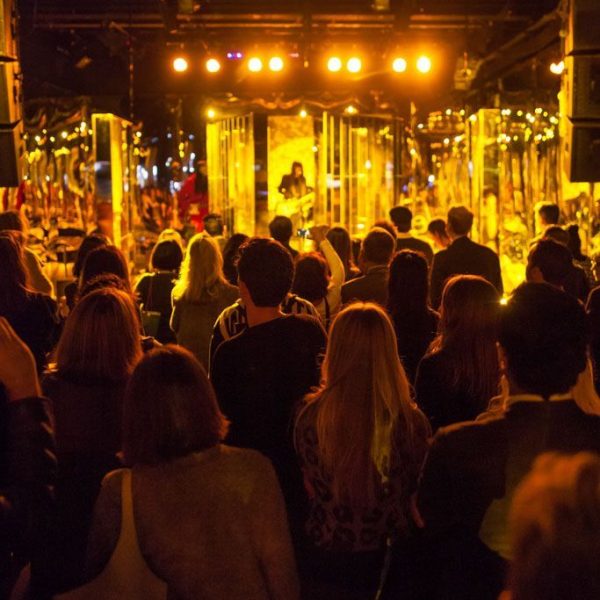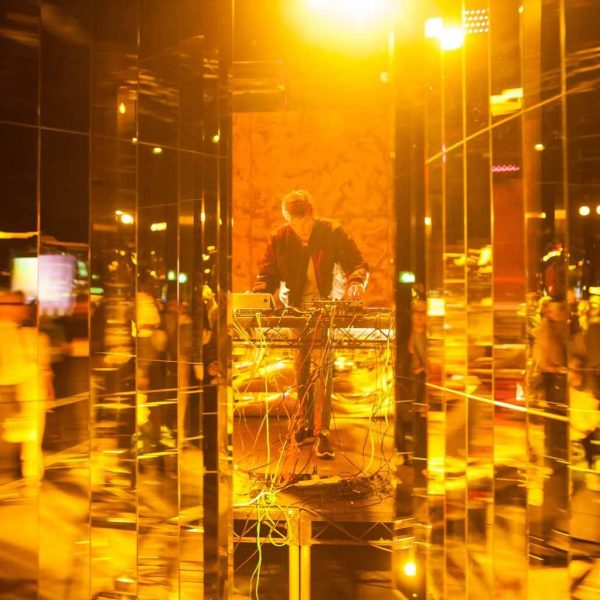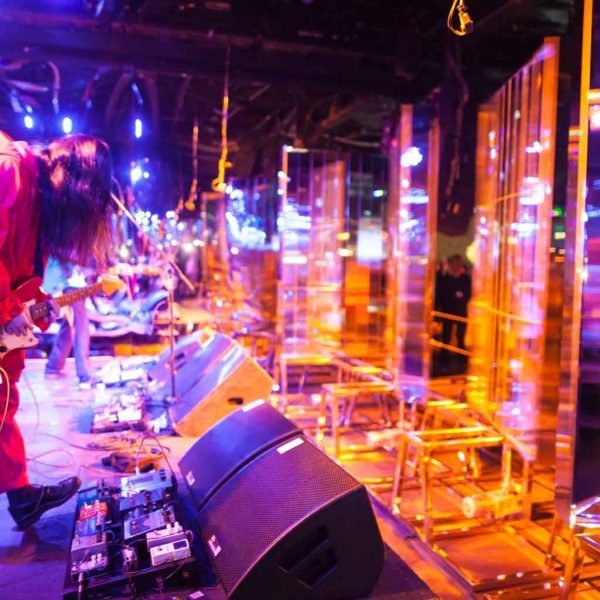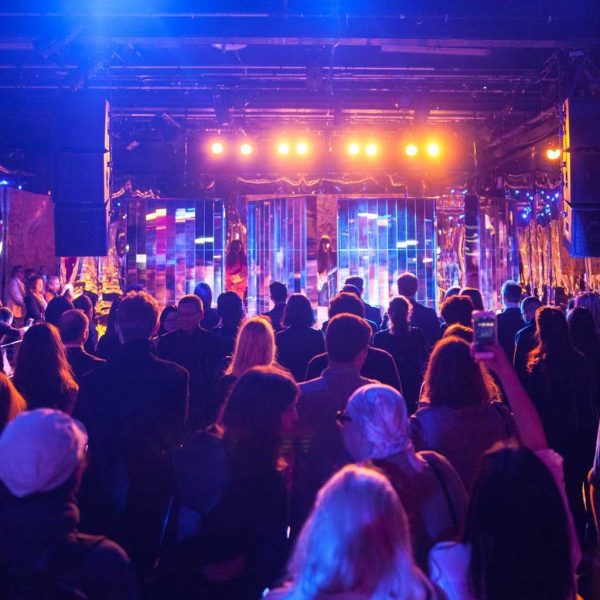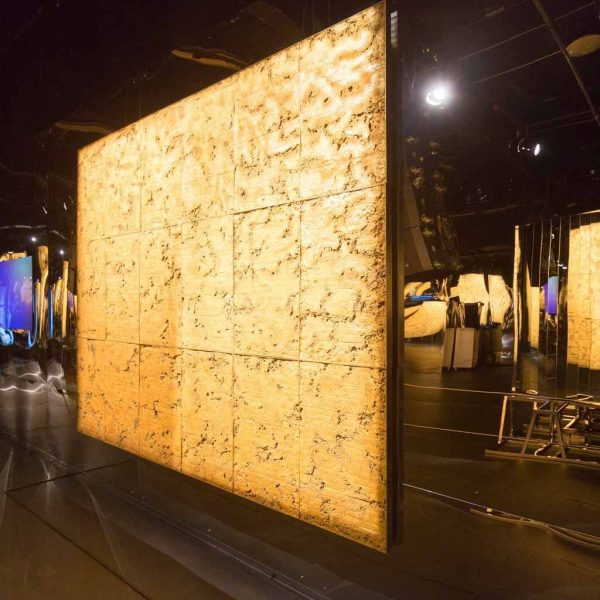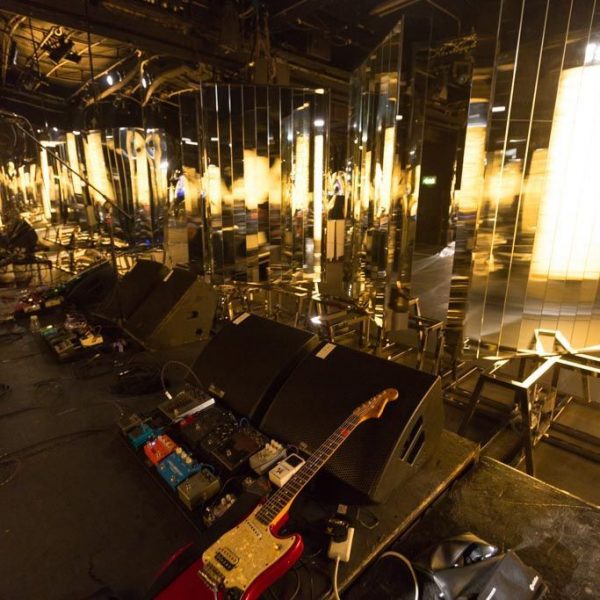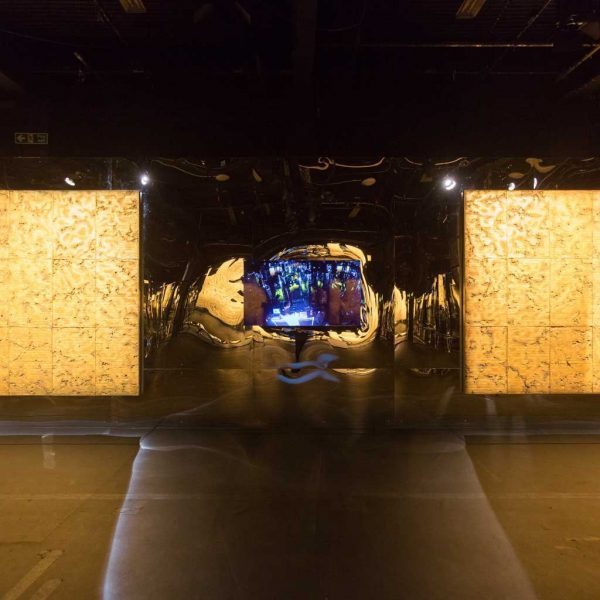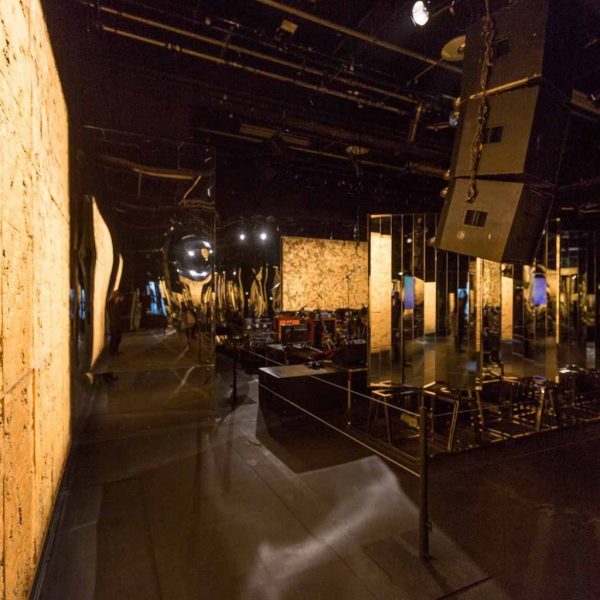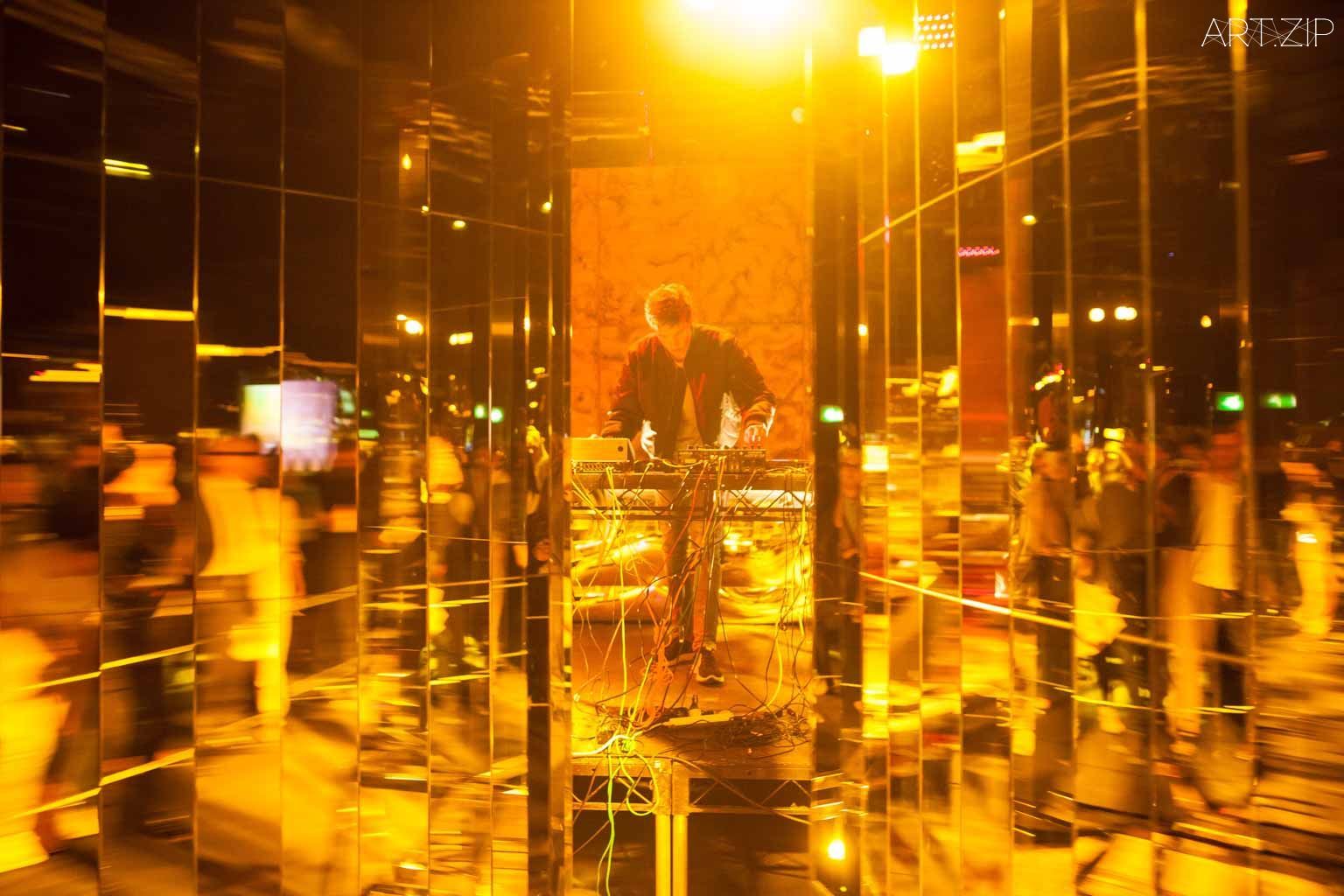
EDITED BY 編輯 x QIWEN KE 柯淇雯
TRANSLATED BY 翻譯 x NICHOLAS ANDERSON 尼古拉斯·安德森
K11 Art Foundation (KAF) and Institute of Contemporary Arts (ICA) jointly presented the first solo UK institutional exhibition of Chinese artist Zhang Ding, entitled Enter the Dragon. The exhibition consisted of an installation that directly references the final scene from the seminal Bruce Lee film Enter the Dragon (1973). Zhang transformed the ICA theatre into a ‘mutating sound sculpture’, covering the room with mirrored surfaces, suspended sound panels and a series of rotating mirrored sculptures situated next to two identical music stages. For the duration of the exhibition a series of daily performances by 28 local bands seek to activate the installation to create a platform for co-operative improvisation, experimentation and self-reflection.
K11藝術基金會(KAF)和倫敦當代藝術研究院(ICA)聯合主辦了中國藝術家張鼎的首場英國個人展覽《張鼎:龍爭虎鬥》。展覽的藝術裝置引用了世界聞名的武打明星李小龍的電影《龍爭虎鬥》(1973)中最後一幕。藝術家張鼎把倫敦當代藝術研究院的劇場空間改造成一座“聲音雕塑”,房間舖滿玻璃鏡面、音響裝置和一連串旋轉的鏡子雕塑被置於兩個表演舞台之間。他公開招募了英國本地的28支樂隊,在這個特殊的舞台上同時進行實驗性和自我觀照的即興表演。
ART.ZIP: In the cooperation between ICA and K11, ICA chose a selection of Chinese artists. How were you chosen to become the resident artist?
ZD: Actually, I’m still not too sure. This is the first joint project between ICA and K11 and the first institution that K11 has a cooperative relationship with in the UK. The ICA not only has a history of putting on this sort of performance art, but also experience with more experimental music. In April 2014, I put on a performance in Beijing called Orbit of Rock. Taking inspiration from the 1991 Monsters of Rock show in Moscow, that legendary show which was rumoured to have contributed to the fall of the USSR, but in actuality it was just a way for the government to show their appreciation of the youth. The ICA felt that this project fitted with their goals and slowly we began to discuss how we could work together.
ART.ZIP: 在這次ICA和K11的合作項目中,由ICA挑選合適的中國藝術家,你是如何被選中成為駐場藝術家的?
ZD: 其實,我也不是很確定(笑)⋯⋯這是ICA和K11第一個合作項目,也是K11在英國的第一家合作機構。ICA有做表演藝術的傳統,而且是有做這種實驗音樂的傳統。2014年4月份我正好在北京做過一個演出項目《一場演出(Orbit of Rock)》,我把1991年在莫斯科紅場的一場演出重新複製了一遍。那場演出算是搖滾界的傳奇了,坊間據傳它顛覆了蘇聯的政權。但實際上不是的,是蘇聯解體後才有的演出,是當時的政府為了感謝莫斯科青年而做的演出。ICA覺得這個項目很符合他們的定位,因此就慢慢開始接洽了。
ART.ZIP: You turned the exhibition space into a concert hall, why is rock music so connected to this project?
ZD: I grew up listening to rock and watching tapes of the performances, it was all rock and metal music. Pantera, The Black Crowes, Metallica, AC/DC, these kinds of groups. When listening I was energised, it really got the blood pumping. Actually this project is not too closely related to my childhood, but it is interesting to watch those tapes again. Since that time has passed, many things have changed and this sort of music scene is now seeing a resurgence. I wanted to try and see if the mood could be replicated. I found four bands, and as long as the tapes are still there, the rhythm of the music can be the same. I feel the ’91 performance also fits the Chinese background, and secondly the USSR and China at that time were close too. Although I didn’t want to focus on politics, I still needed a way to tell the story and the audience connected to it easily.
ART.ZIP: 你把展廳打造成了一個搖滾現場,你為什麼會想要做一個關於搖滾的項目?
ZD: 我從小就聽搖滾了,那時看這場演出的錄像帶,全是金屬音樂,上場的都是Pantera、The Black Crows、Metallica、AC/DC這樣的樂隊,當時覺得身體反應很強烈,血液澎湃得不得了。這個項目其實和我小時候的心情沒太大關係了,但很有意思的是,當我重新看這卷帶子,過了這麼多年,很多事都變了,這種音樂的節奏和現場的感覺好像又找回來了。我就想試一試,看這種情緒的東西是不是也可以被複製。我找了四個樂隊分別翻演了當時的樂隊表演,因為那場演出的資料還在,音樂的節奏是不會變化的。我不會隨便去複製任何一場演出,我覺得91年的那場合適是因為,一來它和我們的歷史背景有關係,二來當時我們和蘇聯有相同的政治背景。雖然我不談政治,但還是需要找一個出處或者說一個典故,大眾才容易接受這個事情。
ART.ZIP: So is there a specific story to tell with the ICA’s show?
ZD: In the beginning we discussed just importing the Beijing show, and it was relatively easy. But I thought that the cultural musical background was too different. Beijing and the UK’s connection is not that strong. I could not simply transfer my memories across. After discussions with the ICA, I decided to create a new project related to Western Culture. I thought of Bruce Lee, who everyone knows, and the last scene of his movie Enter the dragon, which was a mirrored house. That thought was there from the beginning of the project and I gave my project the same name Enter the dragon. The English name also seemed to fit with the international political relations with China. I don’t focus on politics directly, but it wasn’t possible to think of this project without it.
Speaking of culture, national boundaries are not so clear, especially when it comes to music. Unlike visual art which needs more experience to judge it, music is often more straightforward. Over the last few projects it became increasingly clear that I was diluting my artistic identity, and acting more as a producer. For me being the artist is not too important, I wanted to be more like an open source programmer. I just want to be able to express myself. In fact artists in the 60’s to 80’s had this sort of attitude, whereas these days it is not so common. In today’s business environment it seems that artists have returned to the renaissance or classical period. They pursue a strong personal language and become more and more conservative.
ART.ZIP: 那麼這次ICA的演出也有什么说法嗎?
ZD: 最開始的時候我們是討論把北京的演出直接照搬過來,這會相對簡單一點。但我仔細考慮後覺得音樂的文化背景太不一樣了,北京的演出和英國的聯繫不大,我不可能把一個我們記憶裡面的東西帶過來。在和ICA溝通後,我決定重新構思一個和西方文化有關聯的表演。李小龍的電影《龍爭虎鬥》就是這個契機了,所有人都知道他,那部電影的最後一幕正好是鏡屋,我就是從那兒開始做這個項目的。我直接就用了電影的名字《龍爭虎鬥》,其實我反而覺得英文名字更貼切,叫《Enter the Dragon》,直譯過來就是進入龍的境界了。在今天來看,英文名的含義更加契合現今中國的國際政治環境。我還是同樣希望回避政治問題,儘管繞不開,但我不會直接與它發生關係。
而說到文化,分國界就不是那麼清楚了,尤其是音樂,它不像視覺需要很多經驗去判斷,音樂就是用耳朵聽,來得更直接一些。從去年到今年做了幾個項目以後,我越加明確的是,我在淡化我藝術家的身分,我更願意把自己歸為製作人。藝術家不藝術家這件事不重要,就像現在的程序員要開放源代碼是一樣的,我只需要把我想表達的做出來,然後很多東西可以在裡面繼續生長。其實以前的藝術家,六十到八十年代的,他們對藝術有這樣的態度,今天反而沒了。在今天的商業環境下,藝術家好像回到了文藝復興和古典主義時期,他們追求很強烈的個人語言,變得越來越保守了。
ART.ZIP: The sprit of rock and roll pervades this project. In the West, rock is pretty mainstream, but in China it is more niche, what is your take on this phenomenon?
ZD: These ideas are connected. I feel that people who like rock see themselves on the margins. But I think we misread a lot of western artists. Van Gogh is a prime example of artists going crazy and people see rock musicians as doing that too, but there are a lot of western factors as well. In fact I think there is a lot of misunderstanding. We read these legendary biographies and then think we want to be like them.
ART.ZIP: 搖滾的精神一直貫穿在這次演出項目中,搖滾在西方社會可以算主流,但在中國總是處在主流之外,你怎麼看待這個現象?
ZD: 這和意識形態有關係,做搖滾的人也是在自我邊緣化。這裡面存在一種文化誤讀,我們的藝術家對西方的文化誤讀很厲害,梵高(Van Gogh)就是個最典型的例子,他會把很多藝術家都變瘋的。實際上做搖滾的也是,西方有太多的文化因素在裡面了。實際上大家對那些人有多了解呢,沒有多了解,大家全是在看那些傳奇性的自傳,然後看完就覺得我們也要成為這樣的人。
ART.ZIP: The UK and China have different ways of working, did you notice this during this collaboration?
ZD: We communicated very smoothly and there were no real problems, apart from some issues with the budget, when I would have to insist and then they would try their hardest to make it happen. The team at the ICA has a very strong work initiative and there would be emails going back and forth each day solving any issues as they arose including the selection of the band. The curator Matt Williams did not fit my expectations for foreigners, people who would not work during weekends or holidays, Matt was the complete opposite. My team in China was extremely rigorous. More than a month before I arrived, I send ICA a complete set of effect drawings, including details of the installation and floor plans, it was all very accurate. I almost don’t need to be there at the venue.
ART.ZIP: 英國與中國的工作方式大不相同,在這次合作過程中,你有什麼特別的感受嗎?
ZD: 我們的溝通很順利,沒有太大的問題,除了預算上的一些問題,有的時候我會說出我的堅持,他們最後也會盡量實現。ICA團隊的工作主動性很強,大家會每天互通郵件解決問題,包括在樂隊挑選的時候也是。策展人馬特(Matt Williams)和我印象中的老外不太一樣,很多人只要放假就不工作了,馬特完全不一樣。我方的團隊工作也比較嚴謹,在來之前一個多月,我已經發給ICA一套完整的效果圖,包括所有細節安裝的施工圖、平面圖,都很精確。我幾乎都不需要在場。

